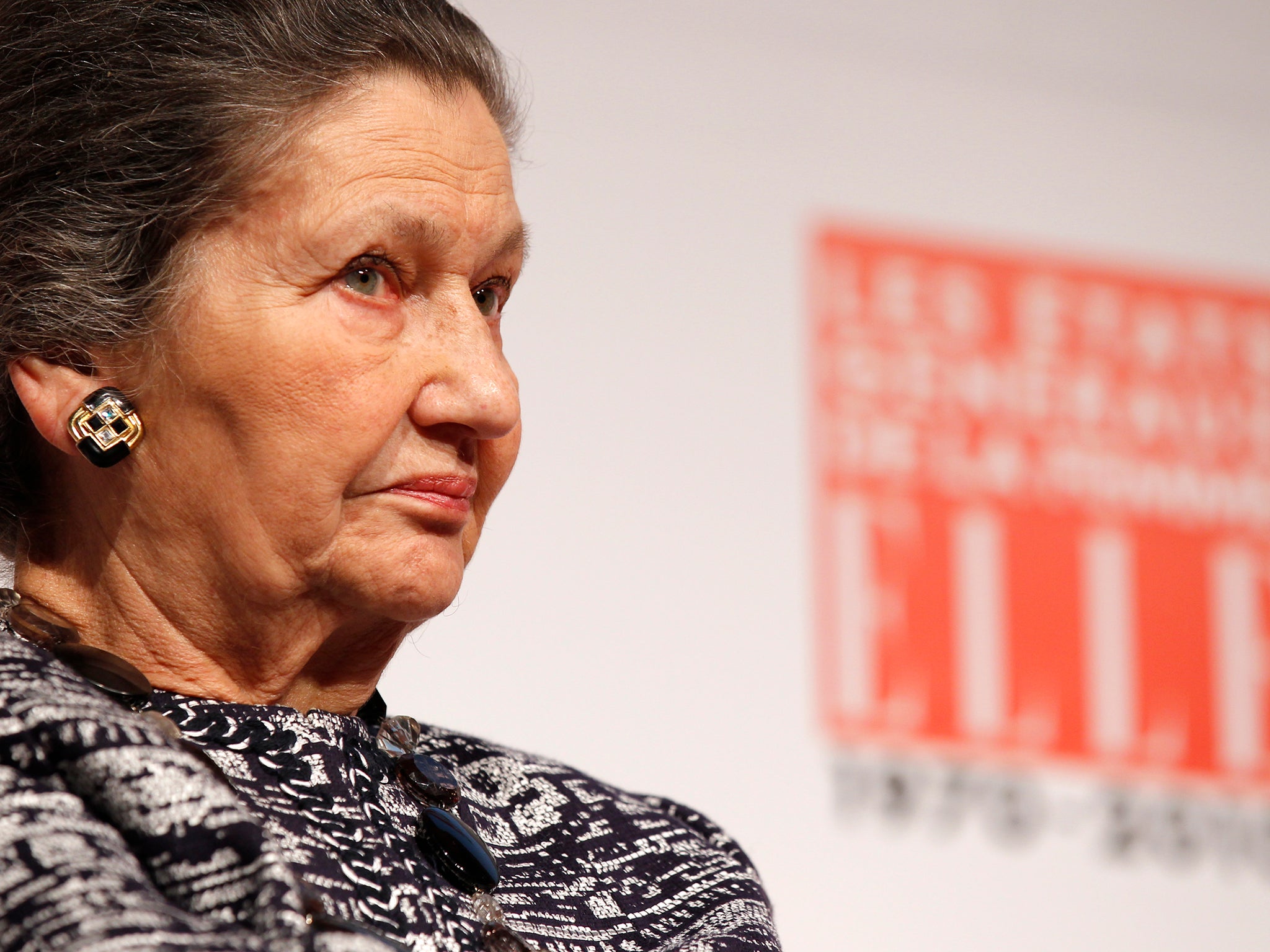Simone Veil dead: French holocaust survivor who went on to legalise abortion dies aged 89
'France has lost a figure that history rarely produces'

Your support helps us to tell the story
From reproductive rights to climate change to Big Tech, The Independent is on the ground when the story is developing. Whether it's investigating the financials of Elon Musk's pro-Trump PAC or producing our latest documentary, 'The A Word', which shines a light on the American women fighting for reproductive rights, we know how important it is to parse out the facts from the messaging.
At such a critical moment in US history, we need reporters on the ground. Your donation allows us to keep sending journalists to speak to both sides of the story.
The Independent is trusted by Americans across the entire political spectrum. And unlike many other quality news outlets, we choose not to lock Americans out of our reporting and analysis with paywalls. We believe quality journalism should be available to everyone, paid for by those who can afford it.
Your support makes all the difference.Simone Veil, a French survivor of the Nazi death camps who spearheaded campaigns to legalise abortion, has died in her Paris home at the age of 89, her family said.
One of France’s most prominent female politicians, Ms Veil commanded wide respect across the political spectrum.
She said her experiences in Auschwitz-Birkenau, where she lost part of her family, made her a firm believer in the unification of Europe.
Speaking to the Associated Press in a 2007 interview, she said: "The idea of war was for me something terrible. The only possible option was to make peace."
From being a deportee in the Second World War, Ms Veil rose to become the first elected President of the European Parliament and a symbol of the peace in Europe. She served as a parliamentary member between 1979 and 1993.
But Ms Veil is best known for leading the heated battle to legalise abortion in the 1970s as the health minister under the centre-right government of Valery Giscard-d’Estaing.
At the time, her critics launched personal attacks against her and her family as the bill raged on the floor of the National Assembly.
At the height of her efforts to pass the legislation, one anti-abortion lawmaker accused her of "wanting to send children to the ovens" - this famously reduced her to tears.
But France eventually became the first mainly Roman Catholic country to legalise abortion and until today the country's abortion rights law is still called the “Loi Veil”.
Throughout the 1970s, she also campaigned to make access to contraception easier following the legalisation of the combined oral contraceptive pill in 1967.
Ms Veil is remembered as a staunch feminist and embraced the label. She saw herself as an advocate for the downtrodden and devoted much of her early career as a judge to improving conditions in French prisons.
Later, she became one of the most visible faces of France's dwindling community of Holocaust survivors and spoke passionately about the need to keep the memory alive.
She was born in Nice in 1927 and was one of four children. Her father was an architect until 1941, when a law by France's collaborationist Vichy government forced him and other Jews out of the profession.
The Gestapo deported Ms Veil, her parents and all but one of her siblings in March 1944. She was 16 years old.
With her mother and sister she was sent to the death camp at Auschwitz-Birkenau but her father and brother were sent to a camp in the Baltic country and were never seen again.
In the preface of a 2005 book on the Holocaust, Ms Veil wrote: "I found myself thrown into a universe of death, humiliation and barbarism.
“I am still haunted by the images, the odours, the screams, the humiliation, the blows and the sky, ashen with the smoke from the crematoriums."
In Auschwitz, Ms Veil caught the eye of a young Polish woman, who helped run the camp. Ms Veil later said in an interview the woman told her she was “too pretty to die here” and told her she would find a way for her to survive.
Ms Veil, her mother and sister were then sent to work at a Siemens factory outside the camp. Later, Ms Veil was transferred to work in a SS kitchen.
Her mother died of typhus at the Bergen-Belsen camp but her sister survived and returned to France with her after the war.
She served again as health minister in the early 1990s during the cohabitation government of left-wing Francois Mitterrand and right-wing Édouard Balladur.
She returned to Auschwitz to commemorate the 60th anniversary of its liberation in January 2005 and she told the Associated Press: "Without the people doing the killing, it was no longer a frightening place."
In 2010, she became the sixth woman to join the Academie Francaise as a guardian of the French language.
Tributes have been pouring in to celebrate Ms Veil’s life achievements.
French President Emmanuel Macron tweeted his condolences to Ms Veil’s family.
"May her example inspire our compatriots, they will found the best of France,” he said.
He was joined by prime minister Edouard Philippe, who said: “Simone Veil will remain the face of a strong, humane and generous Republic. France has lost a figure that history rarely produces.”
Additional reporting by agencies.
Join our commenting forum
Join thought-provoking conversations, follow other Independent readers and see their replies
Comments